Unearthing Biblical Secrets: The Rise and Fall of King Jehoiakim and His Successor
Digging into the mysteries of Ophir's gold and King Jehoiachin's exile - a glimpse into the book 'Biblical Archaeology' Part 4.
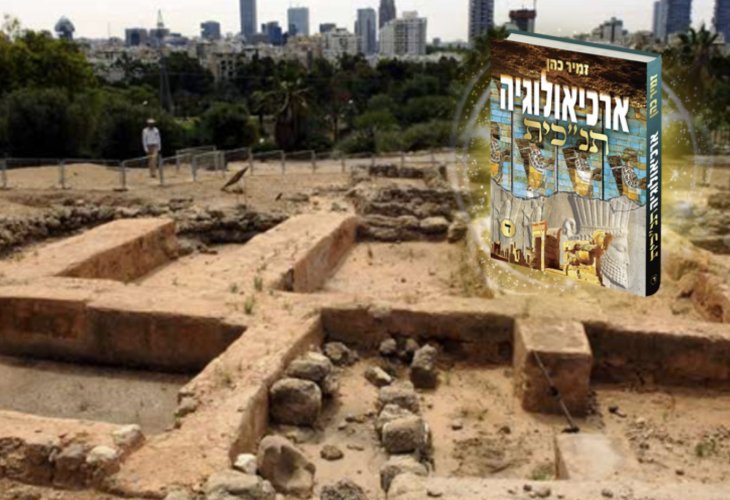 Archaeological excavations at Tel Qasile where pottery with 'Ophir Gold' inscription was found (Photo: Moshe Milner, GOV-IL)
Archaeological excavations at Tel Qasile where pottery with 'Ophir Gold' inscription was found (Photo: Moshe Milner, GOV-IL)In response to Jehoiakim's rebellion, Nebuchadnezzar arrived in 598 BCE with his mighty army to subdue the Kingdom of Judah. Despite Jehoiakim's ties with Pharaoh, king of Egypt, Pharaoh did not aid him as promised due to the superior military power of Nebuchadnezzar:
"And the king of Egypt did not come out from his land anymore [Rashi: To help Jehoiakim]. For the king of Babylon had taken, from the brook of Egypt to the river Euphrates, all that belonged to the king of Egypt."
Just as Jeremiah had forewarned: "And also from Egypt you shall be disappointed [Kingdom of Judah, as their army will not assist you]."
Jehoiakim had no choice but to submit to the rule of the king of Babylon. The scriptures tell us that Nebuchadnezzar at that time seized part of the temple vessels, took them to Babylon, and displayed them in his pagan worship house:
"In the third year of Jehoiakim king of Judah, came Nebuchadnezzar king of Babylon to Jerusalem and besieged it. And the Lord gave Jehoiakim king of Judah into his hand, with part of the vessels of the house of God, which he carried into the land of Shinar to the house of his god; and he brought the vessels into the treasure house of his god."
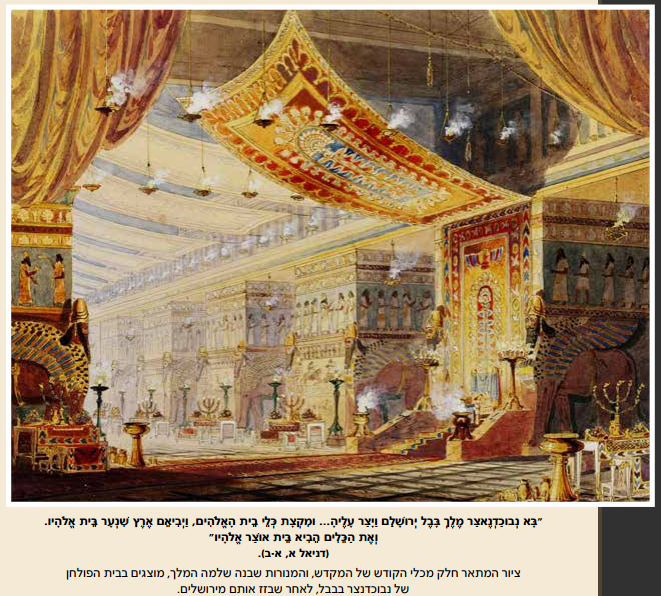 (Given by Mr and Mrs F. M. Paget)
(Given by Mr and Mrs F. M. Paget)Eventually, Nebuchadnezzar deposed Jehoiakim, appointing his young son Jehoiachin in his place:
"Upon him came Nebuchadnezzar king of Babylon, and bound him in chains to carry him into Babylon... and Jehoiachin his son reigned in his stead."
Nebuchadnezzar intended to exile Jehoiakim to Babylon, but the Sages tell us he died before departing: "And he bound him in chains – as soon as he was bound, he died due to his delicacy and died in captivity."
The event is also mentioned in the teachings of the Sages:
"When Nebuchadnezzar [caused the death of Jehoiakim], he enthroned his son Jeconiah [Jehoiachin] in his place, and he was taken to Babylon."
Researchers suggest that the name of King Jehoiachin appears in archaeological findings on jar handles from the end of the First Temple period, found in the Kingdom of Judah – at Ramat Rachel, Beit Shemesh, and Tel Beit Mirsim in the eastern Lachish region. These handles bear Hebrew seal impressions with the words "To Eliakim, a youth of Juchen"; the scholars William Albright and Yochanan Aharoni suggest that "Juchen" is Jehoiachin King of Judah. Eliakim was one of his officials, referred to as a "youth" in the conventional term, symbolizing submission to the king. Eliakim was a common name in the royal court of the time, for instance: "Eliakim who was over the house."
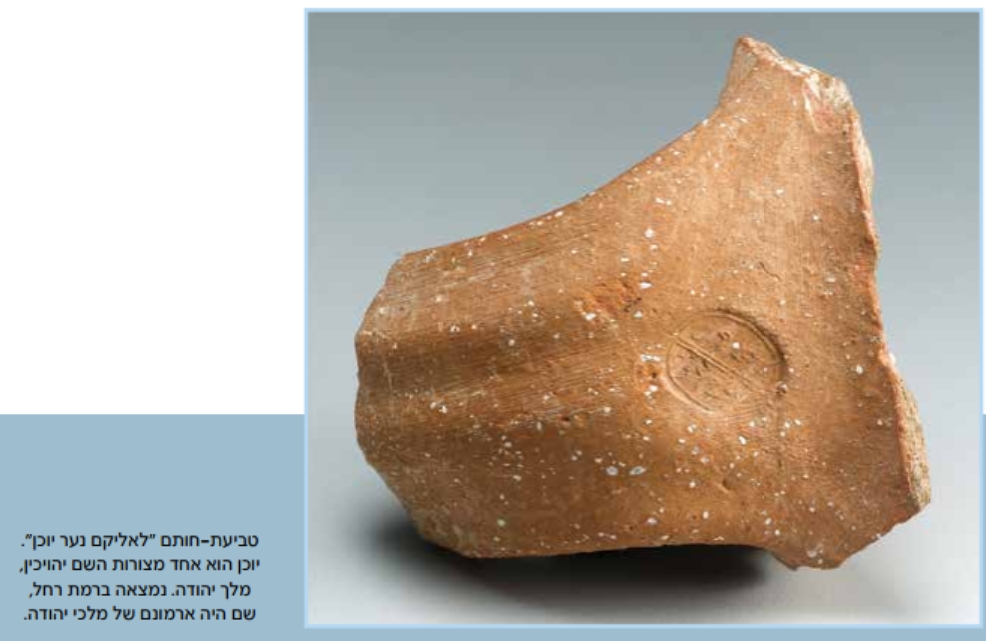 (Photo: Koren Mikey, courtesy of the Israel Antiquities Authority)
(Photo: Koren Mikey, courtesy of the Israel Antiquities Authority)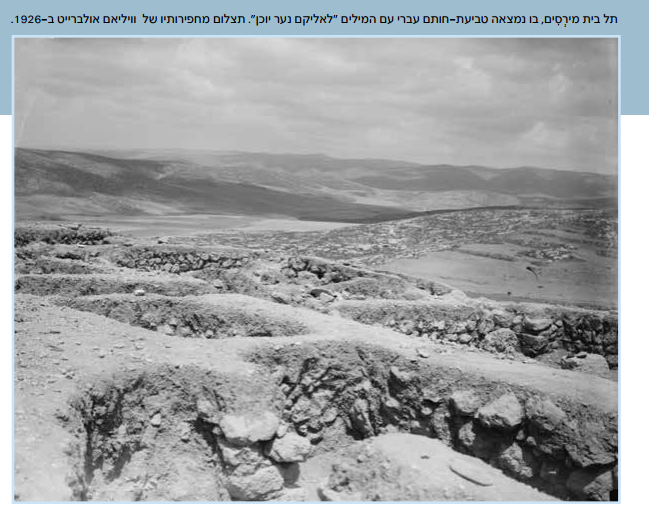
Exile of King Jehoiachin
Jehoiachin reigned for only a short time and was spiritually stagnant. Three months into his reign, Nebuchadnezzar and his army arrived in Jerusalem to depose him:
"Jehoiachin was eighteen years old when he began to reign, and he reigned in Jerusalem three months... and he did evil in the sight of the Lord as his father had done.
At that time, the servants of Nebuchadnezzar king of Babylon came up against Jerusalem and the city fell under siege. Nebuchadnezzar king of Babylon came against the city while his servants put it under siege."
Why did Nebuchadnezzar swiftly deposed and exiled Jehoiachin so soon after appointing him? The Sages reveal the reason:
"When Nebuchadnezzar [killed Jehoiakim], he enthroned Jeconiah his son, and he descended to Babylon. All the Babylonians came out to mock him. His sages said to him: What have you done?
He said to them: Jehoiakim rebelled against me, so I killed him and enthroned his son Jeconiah. They said: A parable says, a good whelp is better than a bad dog. [Their intention was that even Jehoiachin would rebel against him.]
He immediately listened to them... He said to the Israelites: That one whom I enthroned [Jehoiachin], give him to me, and I shall leave...
[Then] Jehoiachin was exiled..."
Jehoiachin surrendered and handed himself over to Nebuchadnezzar, who exiled him to Babylon with his family, his princes, the elite, and thousands of citizens. King of Babylon took the treasures of the house of the Lord and the king's house, including the abundance of gold from Solomon's temple:
"And Jehoiachin king of Judah went out to the king of Babylon, he and his mother, his servants, his princes, and his officers. And the king of Babylon took him... and he brought out from there [from Jerusalem] all the treasures of the house of the Lord and the king's house...
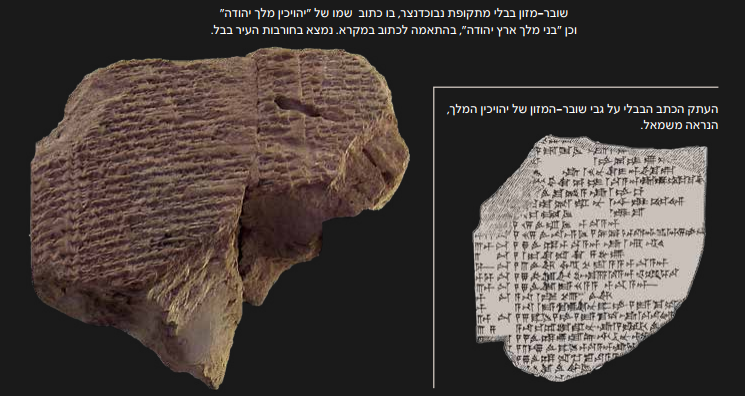
And he exiled all Jerusalem, and all the princes, and all the mighty men of valor, ten thousand exiles, and all the craftsmen and smiths. None remained except the poorest people of the land.
And he carried away Jehoiachin to Babylon, and the king's mother, and the king's wives, and his officers, and the chief men of the land, he took into captivity from Jerusalem to Babylon.
And all the men of valor, seven thousand, and the craftsmen and smiths, one thousand, all of them strong and fit for war; and the king of Babylon carried them into captivity to Babylon."
This exile significantly depleted Judah's spiritual and human resources, as among the exiles were:
a. "The chief men of the land", meaning the sages and the righteous, including "Mordechai the Jew," as told in the Book of Esther.
b. "All the mighty men of valor... and all the men of valor ... all strong men fit for war" – the entire military elite of Judah;
c. "And all the craftsmen and smiths" – skilled technicians essential for the kingdom's functioning (as per Rashi there).
In its deteriorating spiritual, political, and material state, the final decline of the Kingdom of Judah began, as Jeremiah lamented.
The Gold of Ophir in the Temple
The vast amount of gold Nebuchadnezzar looted from the Temple was, at least in part, of the highest quality obtainable at the time, gold imported from the land of Ophir. As King David declared to the assembly regarding the thousands of talents of gold he prepared for the construction of the Temple:
"I have given to the house of my God, beyond all else prepared for the holy house. Three thousand talents of gold, of the gold of Ophir."
Ophir gold was chosen for the Temple due to its finest quality, as mentioned in Genesis: "And the gold of that land is good."
Therefore, Solomon also sent to bring gold from there, as written:
"And they came to Ophir, and fetched from there gold, four hundred and twenty talents, and brought it to King Solomon."
Many years later, King Jehoshaphat of Judah also sent ships to bring gold from Ophir, as recorded in the scriptures:
"Jehoshaphat made Tarshish ships, to go to Ophir for the gold."
The location of the land of Ophir was well known to the kings of Judah and the ancient Near East but has been forgotten over millennia, remaining obscure. Some scholars place it in America, others in East Africa, and some in Yemen or India.
In our time, a striking archaeological discovery in the land of Israel provides evidence for the land of Ophir and the gold imported from there.
At the ancient site of Tel Qasile in Tel Aviv, a piece of pottery was found inscribed with the abbreviated, cursive text typical of the time: "[Z]ahav Ophir to Beit Horon." The pottery is dated to the 10th century BCE, the era of King Solomon, or alternatively to the 9th century BCE, which is the time of King Jehoshaphat – both kings known for bringing gold from Ophir.
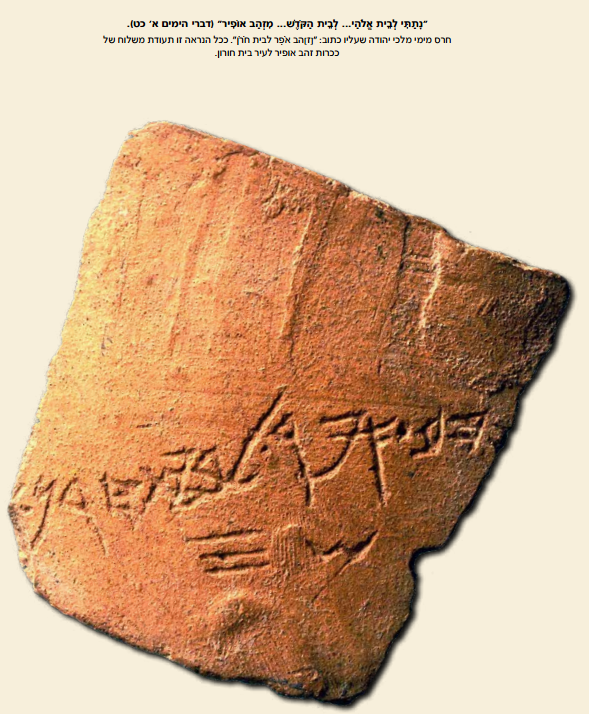 (Photo: Ze'ev Radovan)
(Photo: Ze'ev Radovan)This is a shipping document for Ophir's gold to the city of Beit Horon, on the road to Jerusalem, which the Bible notes Solomon built and fortified: "And he built the upper Beth-horon and the lower Beth-horon, fortified cities, with walls, gates, and bars."
The Siege of Jerusalem and the Exile of Jehoiachin - In Nebuchadnezzar's Inscription
These dramatic events detailed in the Bible are also briefly recorded in the "Chronicles of Nebuchadnezzar," a well-known state clay inscription from the days of the Babylonian king discovered in 1896 in Iraq and displayed in the British Museum. In the paragraph describing the seventh year of Nebuchadnezzar's reign, it is written:
"In the seventh year [of Nebuchadnezzar's reign] in the month of Kislev, the king of Babylon marched with his army.
After conquering the land of Hatti [Syria and Israel], he besieged the city of Judah [Jerusalem].
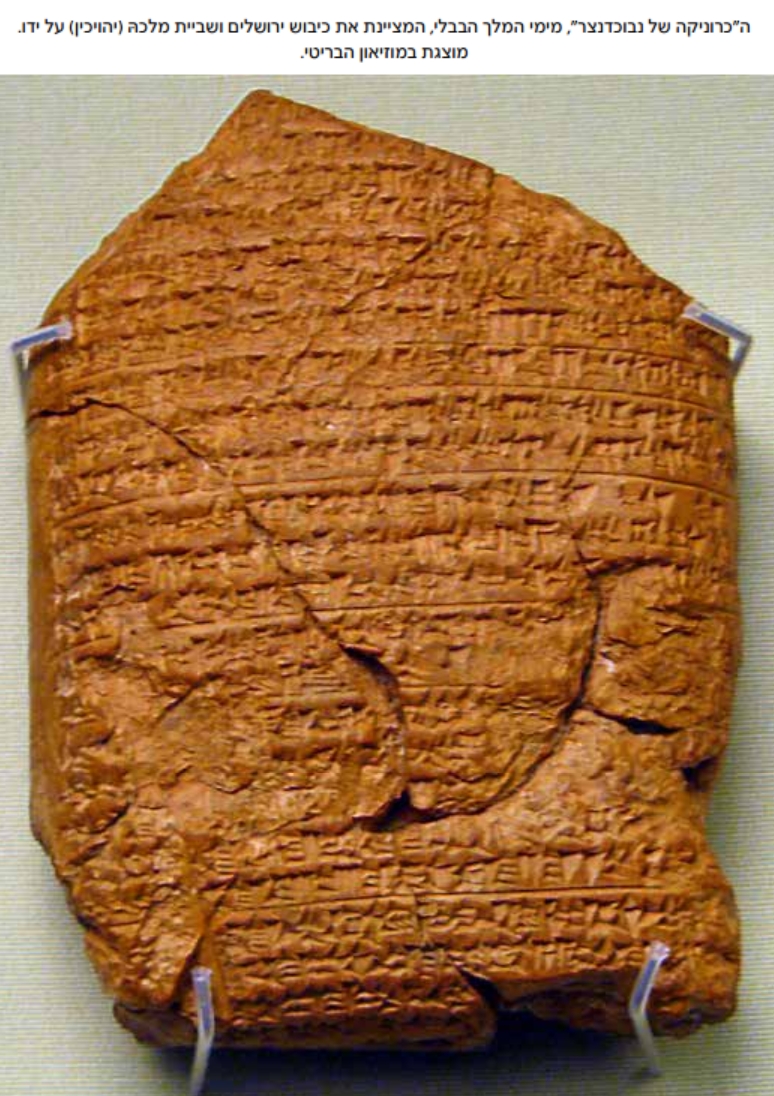 (Photo: Dr. Rivka Lebron)
(Photo: Dr. Rivka Lebron)On the second day of the month of Adar, he captured the city and took its king [Jehoiachin] hostage.
He appointed a king of his choice [Zedekiah] there. He received its great tribute and took it to Babylon."
Though the inscription does not explicitly mention the names of the Judean kings, given its antiquity, its content, and the matching of the dates presented with those referenced in the Bible, it is clear it refers to Jehoiachin and Zedekiah.
To purchase the book "Biblical Archaeology" Part 4, click here.

